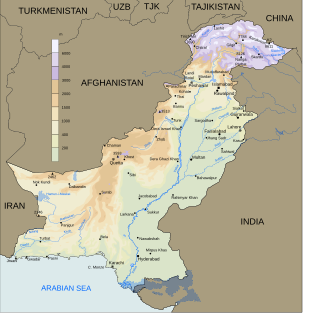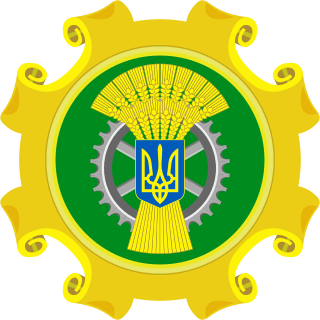
The economy of Paraguay is a market economy that is highly dependent on agriculture products. In recent years, Paraguay's economy has grown as a result of increased agricultural exports, especially soybeans. Paraguay has the economic advantages of a young population and vast hydroelectric power. Its disadvantages include the few available mineral resources, and political instability. The government welcomes foreign investment.

The Ministry of Agriculture, Forestry and Fisheries is a cabinet level ministry in the government of Japan responsible for oversight of the agriculture, forestry and fishing industries. Its acronym is MAFF. The current Minister of Agriculture, Forestry and Fisheries is Taku Etō.

The Election Committee is a Hong Kong electoral college, the function of which is to select the Chief Executive (CE) and, since 2021, to elect 40 of the 90 members of the Legislative Council. Established by Annex I of the Basic Law of Hong Kong which states that "the Chief Executive shall be elected by a broadly representative Election Committee in accordance with this Law and appointed by the Central People's Government ." It is formed and performs its selection function once every five years, even in the event of a CE not completing their term. The membership of the Election Committee was expanded to 1,500 under the massive overhaul of the electoral system in 2021. The Election Committee has been criticised for its "small-circle" electoral basis and its composition favouring pro-Beijing and business interests.

The Peruvian anchoveta is a species of fish of the anchovy family, Engraulidae, from the Southeast Pacific Ocean. It is one of the most commercially important fish species in the world, with annual harvests varying between 3.14 and 8.32 million tonnes from 2010 to 2021.

Agriculture, forestry, and fishing form the primary sector of industry of the Japanese economy together with the Japanese mining industry, but together they account for only 1.3% of gross national product. Only 20% of Japan's land is suitable for cultivation, and the agricultural economy is highly subsidized.

The Ministry of Chemicals and Fertilizers in India is the federal ministry with administrative purview over three departments namely:

Food safety in China is a widespread concern for the country's agricultural industry. China's principal crops are rice, corn, wheat, soybeans, and cotton in addition to apples and other fruits and vegetables. China's principal livestock products include pork, beef, dairy, and eggs. The Chinese government oversees agricultural production as well as the manufacture of food packaging, containers, chemical additives, drug production, and business regulation. In recent years, the Chinese government attempted to consolidate food safety regulation with the creation of the State Food and Drug Administration of China in 2003; officials have also been under increasing public and international pressure to solve food safety problems. Chinese Vice Premier Li Keqiang said, "Food is essential, and safety should be a top priority. Food safety is closely related to people's lives and health and economic development and social harmony," at a State Council meeting in Beijing.

Fishing in India is a major sector within the economy of India contributing 1.07% of its total GDP. The fishing sector in India supports the livelihood of over 28 million people in the country, especially within the marginalized and vulnerable communities. India is the third largest fish producing country in the world accounting for 7.96% of the global production and second largest producer of fish through aquaculture, after China. The total fish production during the FY 2020-21 is estimated at 14.73 million metric tonnes. According to the National Fisheries Development Board the Fisheries Industry generates an export earnings of Rs 334.41 billion. Centrally sponsored schemes will increase exports by Rs 1 lakh crore in FY25. 65,000 fishermen have been trained under these schemes from 2017 to 2020. Freshwater fishing consists of 55% of total fish production.
While Peru accounts for about four per cent of the world's annual renewable water resources, over 98% of its water is available east of the Andes, in the Amazon region. The coastal area of Peru, with most of economic activities and more than half of the population, receives only 1.8% of the national freshwater renewable water resources. Economic and population growth are taking an increasing toll on water resources quantity and quality, especially in the coastal area of Peru.
This page is a list of fishing topics.
Carlos Carrillo Parodi, medical microbiologist, professor and founder of the University Cayetano Heredia, was National Coordinator of the Global Programme of eradication of smallpox in Peru in 1972, founding member of the Society of Infectious Diseases in 1978, and Head of the National Institute of Health in two periods. In 1992 he was National Coordinator of the programme for the eradication of cholera in Peru. Recognized as an expert in National Public Health and Climate Change in 1999/2001. In 2003, is incorporated as Academic number by the National Academy of Medicine, with more than 70 publications in national and international journals. Credited with the IDSA's Award Kass in 2004, in Boston and appointed Member of the Consultative Council of the Foundation Institute Hipolito Unanue in 2006.

Fishing is a major economic activity in Portugal. The country has a long tradition in the sector, and is among the countries in the world with the highest fish consumption per capita. Roman ruins of fish processing facilities were found across the Portuguese coast. Fish has been an important staple for the entire Portuguese population, at least since the Portuguese Age of Discovery.

Fishery and fishing industry plays a significant part in the national economy of Pakistan. With a coastline of about 1,120 km, Pakistan has enough fishery resources that remain to be developed. Most of the population of the coastal areas of Sindh and Balochistan depends on fisheries for livelihood. It is also a major source of export earning.

The Ministry of Transport and Communications of Peru is the government ministry responsible for regulating transportation and communications services. It is headquartered in Lima. As of 6 September 2023, the minister of transport and communications is Raúl Pérez-Reyes.

The Ministry of Development and Social Inclusion of Peru is the government ministry responsible for the implementation of social aid national programs.
Agriculture in Somalia is a major employment activity and is the largest economic sector in the country. It contributes more than 65% to the national GDP from domestic distribution and exports to other parts of the continent, the Middle East and Europe.

The Ministry of Agrarian Policy and Food is the central executive authority of Ukraine in charge of country's agro-development. It is one of the oldest government agencies of Ukraine. On 29 August 2019 the ministry's function were taken over by the Ministry of Economic Development, Trade and Agriculture. On 17 December 2020 the ministry was resurrected.

Qulu Qulu is an archaeological site in Peru. It is located in the Puno Region, Sandia Province, Patambuco District. The site was declared a National Cultural Heritage (Patrimonio Cultural) of Peru by the National Institute of Culture.
Manufacturing in New Zealand contributed $23 billion (12%) of the country's gross domestic product and directly employed 241,000 people in 2017, while manufactured goods made up 52% of the country's exports by value. The food and beverage subsector alone contributed 32% of manufacturing's GDP and 71% of exports.
The National Institute of Quality (INACAL) is a specialized technical public organization affiliated with the Ministry of Production (Peru). It was created in 2014 by Legislative Decree No. 30224, and began its functions on June 1, 2015. The main objective of INACAL is the standardization, accreditation, and metrology of regulations that govern various sectors of the Peruvian market, to contribute to the development and compliance with the national quality policy. Its purpose is to certify the quality of local Peruvian products, align them with international standards, and promote their export. Previously, this task was the responsibility of the National Institute for the Defense of Competition and the Protection of Intellectual Property (INDECOPI). INACAL is a member organization of ISO and COPANT.
















